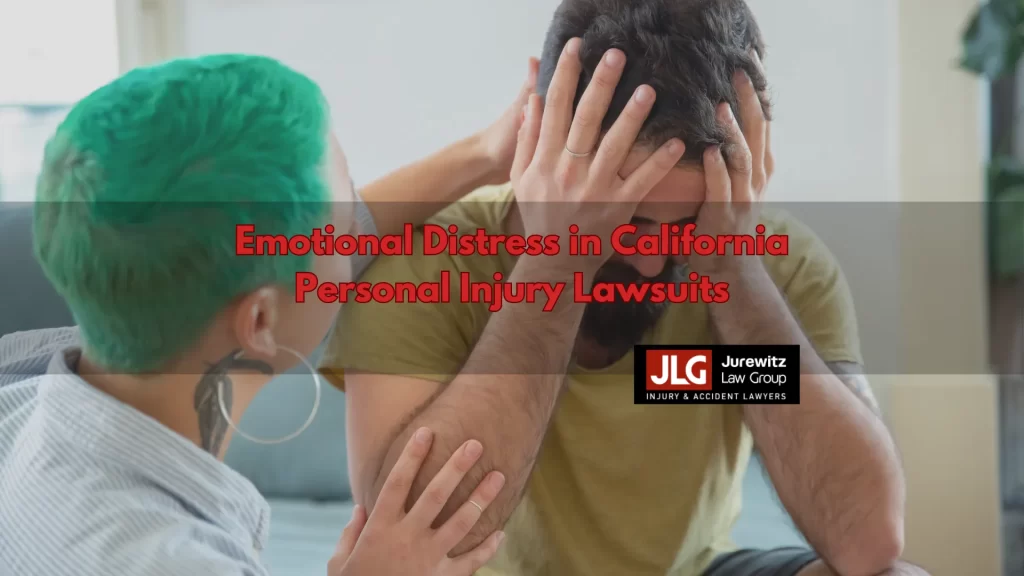
If you have recently sustained injuries in an accident, you know the struggle doesn’t end with medical bills. The stress, the sleepless nights, the anxiety — these invisible wounds need healing, too. The good news is that the California legal system understands that your emotional well-being is just as important as your physical health. That’s why our laws allow you to seek justice for emotional distress caused by someone else’s carelessness.
At Jurewitz Law Group Injury & Accident Lawyers, we believe in a holistic approach to personal injury claims. We can guide you through recovering compensation not only for your physical injuries but also for your emotional pain. Here’s how emotional distress claims work and how we can help you fight for your full recovery.
Types of Emotional Distress Claims
Emotional distress is often a silent burden for those who have been through a traumatic experience. Whether it’s the shock of a car crash or the grief of losing a loved one, the emotional impact of an accident caused by someone else’s wrongdoing can be profound and lasting. Some types of accidents that can cause emotional distress include:
- Car Accidents: The sudden jolt of a car crash can leave you with not just physical injuries but also lasting anxiety.
- Truck Accidents: Collisions involving large trucks can be especially harrowing due to their massive impact. Victims often face intense shock and may struggle with feelings of vulnerability on the road afterward.
- Bicycle Accidents: After colliding with a car, cyclists may develop a deep fear of riding again, shaking their confidence about riding near traffic.
- Pedestrian Accidents: Pedestrians hit by vehicles might recover from their wounds but still suffer from nightmares and a fear of crossing streets.
- Workplace Accidents: Injuries at work can cause people to distrust a once-safe environment, causing anxiety and stress.
- Slip-and-Falls: A slip-and-fall might happen in a flash, but the emotional effects can linger long after the physical injuries heal. These effects may include embarrassment and fear of falling again.
- Medical Malpractice: Trusting a professional with your health and suffering because of their mistake can lead to deep distrust, distress, anxiety, and depression.
- Wrongful Deaths: Losing a loved one unexpectedly due to someone else’s negligence can bring overwhelming grief and a profound sense of injustice.
- Dog Bites: An animal attack, like a dog bite, can result in a long-term phobia of pets that once brought joy. Other effects may include social withdrawal and anxiety.
- Assault and Battery: Survivors of intentional acts like assault can suffer from PTSD, depression, and anxiety.
Calculating Compensation for Emotional Distress Claims in California
In California, there’s no set formula for calculating compensation for emotional turmoil. However, there are methods that insurance companies and courts often use to measure your pain in concrete terms. Here’s a look at how they might approach it:
- Multiplier Method: This is a common technique where your economic damages are multiplied by a number between one and five. (Economic damages are your compensation for things like lost wages, medical bills, and other losses with specific dollar amounts attached.) The more severe the emotional distress, the higher the number.
- Per Diem Method: To use this approach, your lawyer or the court assigns a certain dollar amount to every day you’ve lived with emotional distress. By multiplying this number by the number of days you have experienced distress, they arrive at an amount of compensation for your pain.
- Comparable Cases: Looking at past cases with similar fact patterns that resulted in emotional distress can guide insurers and courts in deciding the value of your suffering.
How to Prove Emotional Distress in California
Unlike physical injuries, emotional pain isn’t visible, so your evidence must speak volumes about your experiences. Here are some types of evidence that can strengthen your claim:
- Personal Journal: Keeping a daily record of your feelings and experiences helps show their ongoing impact, providing a timeline and in-depth insight into your suffering.
- Medical Records: Documentation from psychologists or psychiatrists can establish a professional assessment of your emotional state since the accident.
- Medication Prescriptions: Proof of medications for anxiety, depression, or sleep issues can indicate the severity of your emotional distress.
- Testimony from Friends and Family: Statements from those close to you can highlight changes in your behavior and daily life, offering a personal perspective.
- Expert Witnesses: Mental health experts can explain how the accident affected you psychologically, lending professional credibility to your claim.
Does California Cap Compensation for Emotional Distress?
In California, when you’re hurt because of someone’s actions or inaction, you have the right to compensation for your emotional pain. Usually, there’s no limit to how much you can ask for. That’s because California law does not limit compensation for non-economic damages (compensation for intangible losses) in most cases. Since emotional distress falls under non-economic damages, you can demand as much compensation as the evidence justifies.
However, California law includes two significant exceptions to this rule. They both apply to medical malpractice claims. In these cases, the most you can recover in non-economic damages (including for emotional distress) is $350,000. The other major exception is wrongful death claims that arise out of medical malpractice, where the limit on non-economic damages is $500,000. If your injury claim involves medical malpractice or a wrongful death due to medical malpractice, you’ll need a lawyer’s help to maximize your compensation.
How We Can Help You Recover Compensation for Emotional Distress
 When someone’s actions cause you harm, you can demand compensation for your losses, including your emotional pain. Our California injury lawyers can help by:
When someone’s actions cause you harm, you can demand compensation for your losses, including your emotional pain. Our California injury lawyers can help by:
- Gathering medical records, expert testimony, and other evidence to support your claim.
- Presenting your case to an insurance company and handling settlement negotiations.
- Taking care of all the paperwork in your claim and making sure everything is filed on time.
- Thoroughly documenting your tangible and intangible losses to increase your potential compensation.
- Taking your case to court if the insurance companies will not agree to a fair settlement.
Don’t Try to Handle Your Case Alone. Get Ross.
The California personal injury attorneys at Jurewitz Law Group Injury & Accident Lawyers know that your emotional distress from an accident is as real as your physical injuries. Ross Jurewitz and his team will champion your rights in your battle for justice. Call (619) 233-5020 now or reach out online for a free case evaluation.
Related Posts
Do I Need a Lawyer?
Our No Fee Guarantee
What Do Personal Injury Lawyers Do?

 When someone’s actions cause you harm, you can demand compensation for your losses, including your emotional pain. Our California injury lawyers can help by:
When someone’s actions cause you harm, you can demand compensation for your losses, including your emotional pain. Our California injury lawyers can help by:
